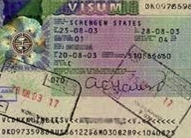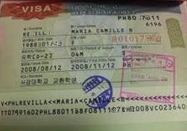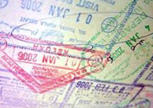European visa
Traveling to European countries has been simplified with the introduction of the so-called Schengen zone or Schengen system which was established by the Schengen Acquis in 1985. This system is represented to the visitors in the form of European visa. The European visa system was introduced with the aim of abolishing internal-border checkpoints and controls and replacing national travel documents with unified European visa documents.
What is European visa
 All European Union member states with the exception of Ireland and the United Kingdom and with the addition of Iceland, Norway, and Switzerland (together called Schengen zone) have a unified visa system. This means that one European visa is sufficient for traveling to any country that complies with the European visa system and that a European visa issued by whichever country can be used to travel to whichever country of the European visa unified system. The European visa holder can travel to any (or all) member states using one single European visa and therefore avoid the expense of obtaining individual visas for each country.
All European Union member states with the exception of Ireland and the United Kingdom and with the addition of Iceland, Norway, and Switzerland (together called Schengen zone) have a unified visa system. This means that one European visa is sufficient for traveling to any country that complies with the European visa system and that a European visa issued by whichever country can be used to travel to whichever country of the European visa unified system. The European visa holder can travel to any (or all) member states using one single European visa and therefore avoid the expense of obtaining individual visas for each country.
The official name for European visa is Schengen visa. The name "Schengen" originates from a small town in Luxembourg. This unified European visa system is supported by a system of Schengen information systems which are used to share information and simplify the European visa process.
Who needs European visa
 The European visa is a so-called visitor visa type of document. The European visa is issued to citizens of countries who are required to obtain European visa before entering Europe. You can find more information about who needs European visa to travel to Europe at the following page Who needs Schengen visa which provides a list of countries whose nationals are required to obtain European visa before entering the Schengen zone.
The European visa is a so-called visitor visa type of document. The European visa is issued to citizens of countries who are required to obtain European visa before entering Europe. You can find more information about who needs European visa to travel to Europe at the following page Who needs Schengen visa which provides a list of countries whose nationals are required to obtain European visa before entering the Schengen zone.
How can I get European visa
The European visa system provides many benefits to travelers. In addition to less bureaucracy, one of the benefits of the unified European visa system is the standardization of the European visa application process. The most important European visa principles and rules are given by the Schengen Acquis; therefore, embassies of all Schengen states should follow the same process. You can find detailed information about the European visa application process at the Schengen visa application page.
Do EU citizens need European visa
 Citizens of individual Schengen zone member countries are exempt from the visa requirement. The goal of the Schengen European visa system was to end internal borders. Citizens of these countries are not only visa-exempt, but they are also legally entitled to enter and reside in each other's countries. This is given by the EU's freedom of movement provisions and by the European Economic Area Agreement.
Citizens of individual Schengen zone member countries are exempt from the visa requirement. The goal of the Schengen European visa system was to end internal borders. Citizens of these countries are not only visa-exempt, but they are also legally entitled to enter and reside in each other's countries. This is given by the EU's freedom of movement provisions and by the European Economic Area Agreement.
More information about European visa
In case you have questions about European visa, you are welcome to ask your questions and discuss European visa in this discussion forum.Disclaimer: This web page is in no way, form or shape affiliated with any official or governmental organization. Even though we do our best to keep this web site current, information provided on this page may be out dated. Never use this or any other private web site to rely on your personal decisions or actions. It is your responsibility to check with the appropriate authorities, government, or offices for the most current information regarding your situation and/or actions. We can not provide any implied or expressed warranty for information provided on this page, site, or server.
Copyright © 2025 Euro Dollar Currency http://www.euro-dollar-currency.com
Reproduction without written permission from the owner of this site is prohibited.
All articles are protected by copyright and have been archived at a national library.
Linking to this page is permitted provided that the links are clearly acknowledged. Thank you.
Reproduction without written permission from the owner of this site is prohibited.
All articles are protected by copyright and have been archived at a national library.
Linking to this page is permitted provided that the links are clearly acknowledged. Thank you.
 Share on Facebook
Share on Facebook Bookmark on Google
Bookmark on Google